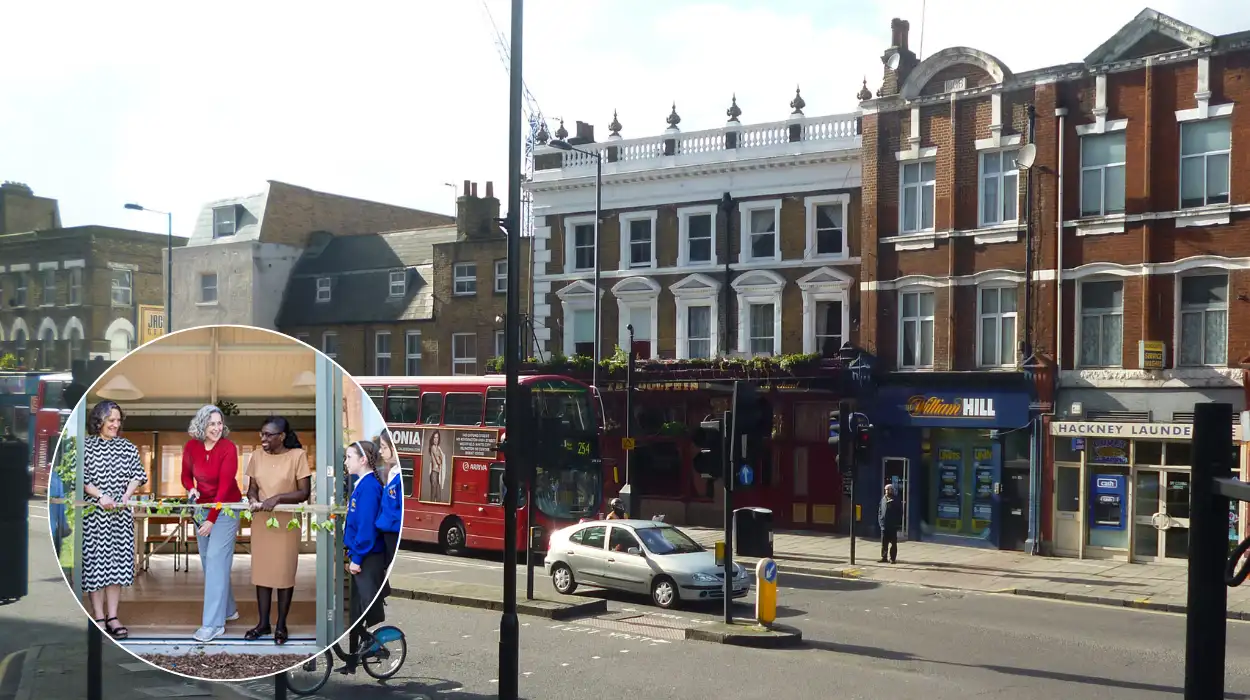Hackney (Parliament Politics Magazine) – Hackney’s pioneering sustainable food school celebrates milestone growth, cementing its role as a leader in eco-conscious culinary education and training.
As reported by Hackney Citizen, in an effort to give every child in the borough a “seed to spoon” education, a sustainable food school is commemorating the opening of its new garden classroom.
The non-profit Hackney School of Food (HSF), located on the grounds of Mandeville Primary School in Clapton, formally opened its new garden room last Thursday.
Constructed from the debris of a former playground, the project has grown into a “fully productive” community center where guests can find themselves encircled by a vegetable garden, fruit orchard, bees, and chickens.
Alongside Mandeville schoolchildren, her cabinet members Anntoinette Bramble and Sarah Young, as well as a few feathered friends, Hackney Mayor Caroline Woodley attended one of the facility’s inaugural culinary classes and cut the ribbon.
Woodley thanked the kids for their participation and called them “ambassadors for a green and growing Hackney.”
“We can help all the bees and pollinators, and my favorite thing to do is feed the chickens,”
stated Ariam, an eight-year-old student at Mandeville.
Louise Nichols, the executive head of Mandeville and two other schools that make up the LEAP federation, led the initial establishment of HSF in 2020.
Prior to this, Nichols had started the acclaimed national charity Chefs in Schools with Ottolenghi veteran Nicole Pisani and LEON co-founder Henry Dimbleby.
The initiative’s goal was to change the way people thought about school meals by bringing restaurant-caliber chefs into kids’ classrooms.
The trust received a memento from the former school building when Clapton’s Mandeville Primary joined the federation in 2017: a caretaker cottage that had to be used for educational purposes in order to be converted.
In order to aid attempts to change the narrative around food, the project’s organizers saw a need for training opportunities for school kitchen staff, who are “often undervalued and lacking professional development.”
“We’re in a very deprived corner of Hackney. We wanted to make sure the children who live in this area had access somewhere that they could see things growing and understand the journey of food production,”
Nichols said.
By 2020, HSF had obtained funding to transform a “stretch of tarmac into a vibrant garden” and transform the former premises manager’s lodge into a teaching kitchen, following years of fundraising.
Construction was finished in February of that year, but activities were halted due to lockdown limitations.
As volunteers banded together to help create this urban food oasis, the area became a “rare and vital refuge” for Hackney residents throughout the pandemic.
After gaining support from the local government and becoming a community interest corporation (CIC), HSF was able to finance its food workshops for all third-graders in the borough.
“It was brilliant for those children,”
said Mandeville’s headteacher, Marc Thompson, who is keen to make this flavour of education “a mainstay of the life experience of a happy pupil”.
General manager, Zoë McIntyre, said:
“The creativity of cooking and having the right nutrients are, of course, important.
But the whole point of what we do here is to give children a positive engagement with food – cooking from scratch and seeing it as a joy and a delight.”
The Mayor of London provided the majority of the funding for the construction of the accessible, light-filled garden room through the “High Streets for All Challenge” program, with “generous” extra assistance from a number of charity trusts.
The mayor of Hackney praised the “ambitious” CIC and its “extraordinary” new facilities in an interview with the Citizen at the occasion.
“They’re just unstoppable,”
she said.
Even if the food school achieved a new milestone last week, sustainable funding sources are still essential for the future.
Since school and local government finances are being squeezed, HSF is concentrating on corporate partnerships and community involvement.
This entails securing funding for lesson segments from large supermarkets, food manufacturers, eateries, and others who are “just generally interested in the health of the nation,” according to Nichols.
“We’d like to be able to do more of the free community cooking classes funded by outside sources,”
she added, pointing to past culinary lessons HSF designed for diabetic men.
The Citizen asked Hackney’s mayor if she saw food school hubs like these opening up in the borough soon, as organizers get ready to submit an application for council funding in its upcoming round.
“If it’s successful, it’s something I’d love to replicate,”
she said.
“But one step at a time”.
How will the pilot impact the overall sustainability of school meals in Hackney?
Through Growing Communities’ Better Food Shed, the experiment allows two Hackney primary schools to serve only organic fruit and vegetables in all of their meals.
This change lessens dependency on traditional supply chains, promoting environmentally sustainable, climate-friendly farming and creating new, reliable markets for regional organic farmers.
The pilot’s emphasis on organic and locally grown produce lowers food miles and related emissions, which directly supports Hackney Council’s goals to reduce carbon emissions and address food waste from the ground up.
The schools have been able to keep costs down while reducing the carbon footprint of their menus by serving more plant-based, seasonal meals and utilizing inexpensive pulses.
Without raising meal costs, the experiment shows that sustainable, reasonably priced school meals can be produced on a large scale.


